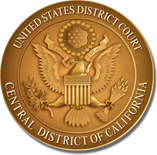
An injunction is an equitable remedy in the form of a special court order that compels a party to do or refrain from specific acts. "When a court employs the extraordinary remedy of injunction, it directs the conduct of a party, and does so with the backing of its full coercive powers." A party that fails to comply with an injunction faces criminal or civil penalties, including possible monetary sanctions and even imprisonment. They can also be charged with contempt of court.
Beginning in 2003, The SCO Group was involved in a dispute with various Linux vendors and users. SCO initiated a series of lawsuits, the most known of which were SCO v. IBM and SCO v. Novell, that had implications upon the futures of both Linux and Unix. SCO claimed that Linux violated some of SCO's intellectual properties. Many industry observers were skeptical of SCO's claims, and they were strongly contested by SCO's opponents in the lawsuits, some of which launched counter-claims. By 2011, the lawsuits fully related to Linux had been lost by SCO or rendered moot and SCO had gone into bankruptcy. However the SCO v. IBM suit continued for another decade, as it included contractual disputes related to both companies' involvement in Project Monterey in addition Linux-related claims. Finally in 2021 a settlement was reached in which IBM paid the bankruptcy trustee representing what remained of SCO the sum of $14.25 million.

Jacobsen v. Katzer was a lawsuit between Robert Jacobsen (plaintiff) and Matthew Katzer (defendant), filed March 13, 2006 in the United States District Court for the Northern District of California. The case addressed claims on copyright, patent invalidity, cybersquatting, and Digital Millennium Copyright Act issues arising from Jacobsen under an open source license developing control software for model trains.
Chicago Life Insurance Co. v. Needles, 113 U.S. 574 (1885), was a decision by the United States Supreme Court. It involved the writ of error regarding a denial of a motion and final judgment rendered perpetually enjoining Chicago Life Ins. Co. from further prosecution of its business. From that judgment, a writ of error was prosecuted to the supreme court of the state, where, among other things, was assigned for error the refusal of the court of original jurisdiction to adjudge that the said statutes of Illinois were in violation of the Constitution of the United States. The judgment of the inferior court was in all things affirmed by the supreme court of the state, and from that judgment of affirmance the present writ of error is prosecuted.
Fujifilm Corp v. Benun, 605 F.3d 1366 was a case in which the United States Court of Appeals for the Federal Circuit affirmed the judgment made by the United States District Court for the District of New Jersey that the defendants infringed patents owned by Fujifilm Corporation.

Arista Records LLC v. Lime Group LLC, 715 F. Supp. 2d 481, is a United States district court case in which the Southern District of New York held that Lime Group LLC, the defendant, induced copyright infringement with its peer-to-peer file sharing software, LimeWire. The court issued a permanent injunction to shut it down. The lawsuit is a part of a larger campaign against piracy by the Recording Industry Association of America (RIAA).

Cambridge University Press et al. v. Patton et al., 1:2008cv01425, was a case in the United States District Court for the Northern District of Georgia in which three publishers, Cambridge University Press, SAGE Publications, and Oxford University Press, initially filed suit in 2008 against Georgia State University for copyright infringement.
The smartphone wars or smartphone patents licensing and litigation refers to commercial struggles among smartphone manufacturers including Sony Mobile, Google, Apple Inc., Samsung, Microsoft, Nokia, Motorola, Huawei, LG Electronics, ZTE and HTC, by patent litigation and other means. The conflict is part of the wider "patent wars" between technology and software corporations.
Motorola Mobility v. Apple Inc. was one of a series of lawsuits between technology companies Motorola Mobility and Apple Inc. In the year before Apple and Samsung began suing each other on most continents, and while Apple and High Tech Computer Corp. (HTC) were already embroiled in a patent fight, Motorola Mobility and Apple started a period of intense patent litigation. The Motorola-Apple patent imbroglio commenced with claims and cross-claims between the companies for patent infringement, and encompassed multiple venues in multiple countries as each party sought friendly forums for litigating its respective claims; the fight also included administrative law rulings as well as United States International Trade Commission (ITC) and European Commission involvement. In April 2012, the controversy centered on whether a FRAND license to a components manufacturer carries over to an equipment manufacturer incorporating the component into equipment, an issue not addressed in the Supreme Court's default analysis using the exhaustion doctrine in Quanta v. LG Electronics. In June 2012, appellate judge Richard Posner dismissed the U.S. case with prejudice and the parties appealed the decision a month later.
Apple Inc. v. Samsung Electronics Co., Ltd. was the first of a series of ongoing lawsuits between Apple Inc. and Samsung Electronics regarding the design of smartphones and tablet computers; between them, the companies made more than half of smartphones sold worldwide as of July 2012. In the spring of 2011, Apple began litigating against Samsung in patent infringement suits, while Apple and Motorola Mobility were already engaged in a patent war on several fronts. Apple's multinational litigation over technology patents became known as part of the mobile device "smartphone patent wars": extensive litigation in fierce competition in the global market for consumer mobile communications. By August 2011, Apple and Samsung were litigating 19 ongoing cases in nine countries; by October, the legal disputes expanded to ten countries. By July 2012, the two companies were still embroiled in more than 50 lawsuits around the globe, with billions of dollars in damages claimed between them. While Apple won a ruling in its favor in the U.S., Samsung won rulings in South Korea, Japan, and the UK. On June 4, 2013, Samsung won a limited ban from the U.S. International Trade Commission on sales of certain Apple products after the commission found Apple had violated a Samsung patent, but this was vetoed by U.S. Trade Representative Michael Froman.

Microsoft Corp. v. Motorola Inc., 696 F.3d 872 was a United States Court of Appeals for the Ninth Circuit case about Reasonable and Non-Discriminatory (RAND) Licensing and foreign anti-suit injunction.
Google has been involved in multiple lawsuits over issues such as privacy, advertising, intellectual property and various Google services such as Google Books and YouTube. The company's legal department expanded from one to nearly 100 lawyers in the first five years of business, and by 2014 had grown to around 400 lawyers. Google's Chief Legal Officer is Senior Vice President of Corporate Development David Drummond.

Executive Order 13769 was signed by U.S. President Donald Trump on January 27, 2017, and quickly became the subject of legal challenges in the federal courts of the United States. The order sought to restrict travel from seven Muslim majority countries: Iran, Iraq, Libya, Somalia, Sudan, Syria, and Yemen. The plaintiffs challenging the order argued that it contravened the United States Constitution, federal statutes, or both. On March 16, 2017, Executive Order 13769 was superseded by Executive Order 13780, which took legal objections into account and removed Iraq from affected countries. Then on September 24, 2017, Executive Order 13780 was superseded by Presidential Proclamation 9645 which is aimed at more permanently establishing travel restrictions on those countries except Sudan, while adding North Korea and Venezuela which had not previously been included.

Executive Order 13768 titled Enhancing Public Safety in the Interior of the United States was signed by U.S. President Donald Trump on January 25, 2017. The order stated that "sanctuary jurisdictions" including sanctuary cities that refused to comply with immigration enforcement measures would not be "eligible to receive Federal grants, except as deemed necessary for law enforcement purposes" by the U.S. Attorney General or Secretary of Homeland Security.
Trump v. Hawaii, No. 17-965, 585 U.S. ___ (2018), was a landmark United States Supreme Court case involving Presidential Proclamation 9645 signed by President Donald Trump, which restricted travel into the United States by people from several nations, or by refugees without valid travel documents. Hawaii and several other states and groups challenged the Proclamation and two predecessor executive orders also issued by Trump on statutory and constitutional grounds. Citing a variety of statements by Trump and administration officials, they argued that the proclamation and its predecessor orders were motivated by anti-Muslim animus.

Stone v. Trump (1:17-cv-02459-MJG) was a lawsuit filed on August 28, 2017 in the United States District Court for the District of Maryland. The lawsuit alleged that President Donald Trump's ban on transgender personnel joining the U.S. military violated their equal protection and due process rights. The American Civil Liberties Union (ACLU) of Maryland filed the suit on behalf of Petty Officer First Class Brock Stone, an 11-year veteran of the U.S. Navy, and several other transgender service members. In addition to President Trump, the suit named as defendants the Secretaries of Defense, the Army, the Navy, and the Air Force.

Jane Doe v. Trump (1:17-cv-01597-CKK) was a lawsuit filed on August 9, 2017, and decided January 4, 2019 in the United States District Court for the District of Columbia. The suit sought to block Donald Trump and top Pentagon officials from implementing the proposed ban on military service for transgender people under the auspices of the equal protection and due process clauses of the Fifth Amendment. The court ruled that the Trump administration's policy should not be blocked. Nonetheless, the Trump administration's policy continued to be blocked due to three preliminary injunctions against it that were not part of this lawsuit and which remained in effect as of the lawsuit's conclusion on January 4, 2019.

Stockman v. Trump (5:17-cv-01799-JGB-KKx) is an old lawsuit filed on September 5, 2017, in the United States District Court for the Central District of California. The suit, like the similar prior suits Jane Doe v. Trump, Stone v. Trump, and Karnoski v. Trump, sought to block Trump and top Pentagon officials from implementing the proposed ban on military service for transgender people under the auspices of the equal protection and due process clauses of the Fifth Amendment. The suit was filed on the behalf of four named and three anonymous transgender plaintiffs by Equality California (EQCA). Two other major LGBT-rights organizations which had filed Jane Doe v. Trump, GLBTQ Legal Advocates & Defenders (GLAD) and the National Center for Lesbian Rights, joined the suit as co-counsels in October 2017.

Karnoski v. Trump (2:17-cv-01297-MJP) was a lawsuit filed on August 29, 2017 in the United States District Court for the Western District of Washington. The suit, like the similar suits Jane Doe v. Trump, Stone v. Trump, and Stockman v. Trump, sought to block Trump and top Pentagon officials from implementing the proposed ban on military service for transgender people under the auspices of the equal protection and due process clauses of the Fifth Amendment. The suit was filed on the behalf of three transgender plaintiffs, the Human Rights Campaign, and the Gender Justice League by Lambda Legal and OutServe-SLDN.
In United States law, a nationwide injunction is injunctive relief in which a court binds the federal government even in its relations with nonparties. In their prototypical form, nationwide injunctions are used to restrict the federal government from enforcing a statute or regulation.











